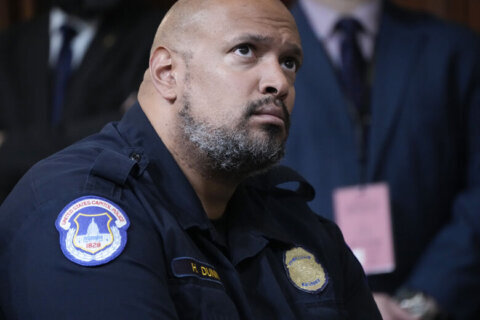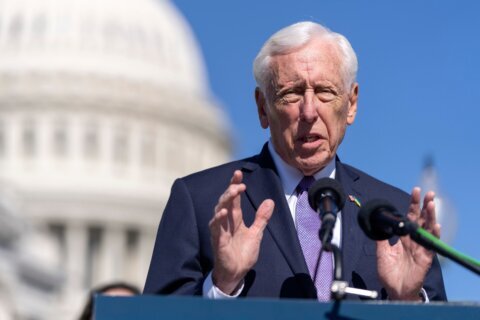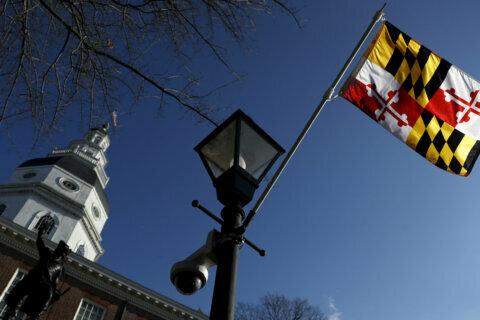This November, each position up for election in Maryland will feature a “write-in” candidate line where Marylanders can vote for whomever they feel is best qualified for the job — or they can write-in a joke candidate.
Be it Mickey Mouse for President, Beyoncé for Senate, or Shrek for Mayor, Marylanders have the liberty to vote for whomever they want. Just don’t expect those names to show up in state records.
That’s because Maryland law requires that candidates must file with the State Board of Elections for officials to keep record of those votes, even if the names do not show up on ballots.
“You know how you say, ‘Well, how many people vote for Mickey Mouse?’ We don’t keep records of those,” Elections Administrator Jared DeMarinis said. “We only keep records of those that are officially write-in candidates, not anything else.”
Still, every election cycle thousands of Marylanders pass on the nominated Democratic, Republican and other major party candidates in favor of a write-in. Most states in the U.S. have a process to include write-in candidates in elections, though the requirements vary by state.
According to DeMarinis, it’s a relatively simple process to file to run as a write-in candidate in Maryland.
“You just have to submit a certificate of candidacy to the state board of elections within a certain timeline … and then you become an official write-in candidate,” he said. “It’s a simple process. There’s no filing fee for write-in candidates.”
Robin Rowe, a Baltimore resident and chief technologist at an engineering firm, agrees that it was “surprisingly easy” for him to file as an official write-in candidate to run for Maryland’s open U.S. Senate seat. Since he’s not showing up on the ballot, he did not need to collect signatures or raise money. He just needed to register with the state.
Rowe started running for office back in 2020, when he lived in Beverly Hills, California. During that time, he ran for city council and for school board, both times unsuccessfully, before moving to Baltimore in April.
“I felt that in running for office, I affected local politics,” he said.
The self-identified “Bernie-crat,” aligning his policy positions with U.S. Sen. Bernie Sanders (I-Vt.), decided to throw his name into the Maryland Senate race as an unaffiliated write-in candidate, proposing that he is the choice for people who don’t like either of the leading candidates in the race.
That would be former Gov. Larry Hogan (R) and Prince George’s County Executive Angela Alsobrooks (D).
Rowe knows his chances of winning the Senate race are almost nonexistent, but he finds that there’s value in running by changing the conversation of what elections could look like.
“I’m too woke, and I am not taking donations,” Rowe said. “So under our current political system, it seems impossible for me to win in any election in this pay-to-win election system that we have. But I can affect the future just by the act of running.”
Write-ins mostly unnoticed in elections
DeMarinis noted that the presidential office is usually attracts the most write-in candidates.
This fall, there are 21 certified write-in candidates for president and four write-in candidates for Senate, which includes Rowe. There are no official write-in candidates for the state’s eight House seats, though the write-in line will be available on every ballot.
Official write-in candidates for president, for example, have never topped 0.0% of the vote in a general election going back to 2004, according to State Board of Elections data. In 2020, there were 1,117 Marylanders who wrote in music producer and rapper Kanye West in his unsuccessful run president, and in 2012 there were 625 write-in votes for presidential candidate Santa Claus, a man from Nevada.
But the official write-in candidates are eclipsed every year by “other Write-Ins,” the catch-all category for those who were not registered with the elections board, state records show.
In the 2020 presidential race, there were 18,045 votes for “other write-ins” in Maryland, about 0.6% of votes for president that year, compared to a total of 2,377 votes for all the official write-in candidates. In 2016, there were 33,263 Marylanders who voted for “other write-ins,” 1.2% of vote, compared to the 11,572 for official write-in candidates for president that year.
Alexander Pope, an associate professor at Salisbury University and the director of its Institute for Public Affairs and Civic Engagement, believes it makes sense to have a process in place to register as an official write in candidate.
“I don’t like saying that we shouldn’t count all the votes, but if you think about how broad and diverse even a relatively small state like Maryland is, you know that the people doing the tallying need some sort of structure to it to make sure that … the count is right,” he said.
“So if someone writes ‘Mickey Mouse,’ and someone writes ‘M. Mouse’ and someone writes ‘Mickey M.,’ they (election officials) would need to know what they are looking for and make sure that those (votes) are going in the right place,” Pope said.
In Maryland, if there is a misspelling in an official write-in candidate’s name, the vote will still go toward that candidate, so long as election officials can identify the name.
“You’d also want the the person who’s having their name written in to approve, that they would be willing to serve in that capacity,” Pope added. “Because you don’t want to select someone who is not eligible or otherwise unwilling or unable to take that role.”
The process requiring candidates to file as a write-in in order for the state to tally their votes became law in 2000, under then SB 73. According to the fiscal note at the time:
“Following the 1998 general election, a petition was filed with the State Board of Elections requesting that write-in votes cast in the gubernatorial election be counted, and as a result of the petition, the local boards of canvassers were asked to tabulate all write-in votes … The majority of non-certified write-in votes were cast for fictitious characters (e.g. Donald Duck, Superman, etc.) or for other bogus candidates (e.g. Cal Ripken Jr., Richard Nixon, etc.).”
Pope said that while write-in candidates usually don’t make much of a splash in races, they’re still important for the democratic process.
“Write-in candidates give people an opportunity to vote for someone outside of the formal structure, which is an important part of democracy,” Pope said. “You can vote for whomever you want. Doesn’t have to be someone that a major political party has said is an acceptable candidate.
“There’s a lot of conceptual attractiveness of write-in candidates — it feels like a democratic sort of thing,” he said.







